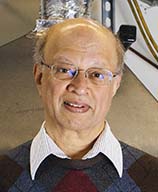What "small tech" solutions can offer outsize benefits in the developing world?
As we rethink our energy use, we focus on the highest polluters, and at a global scale. But energy use at a much finer scale seriously threatens the health and safety of hundreds of millions of people who still cook on inefficient wood stoves in developing countries. Chronic inhalation of the smoke will kill about four million of them this year. Intense harvesting of fuelwood can put pressure on forests. And in some regions women risk violence as they walk farther from home to collect fuelwood. In 2005, Berkeley professor Ashok Gadgil and his students launched the Berkeley Darfur Stove project to design and build efficient and inexpensive stoves. They then created a non-profit to manufacture the $20 stoves in Mumbai. The stoves’ efficiency halves the fuelwood to cook each meal, and the time needed to collect it. Women purchasing fuelwood saved about $260 per year. Gadgil believes that distributed “small-tech” strategies can have outsize benefits to the people who need them most.
 Ashok Gadgil
Ashok Gadgil
Ashok’s research ranges from computational fluid dynamics of indoor air and pollutant flows, building energy efficiency, and methods to treat drinking water to make it potable. He has developed groundbreaking technologies for the developing-world including, UV Waterworks, a simple, effective, and inexpensive water disinfection system, and the Berkeley-Darfur Stove, a low-cost stove that saves fuelwood in internally displaced person's camps in Darfur. Read more about Ashok Gadgil.